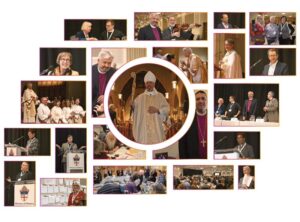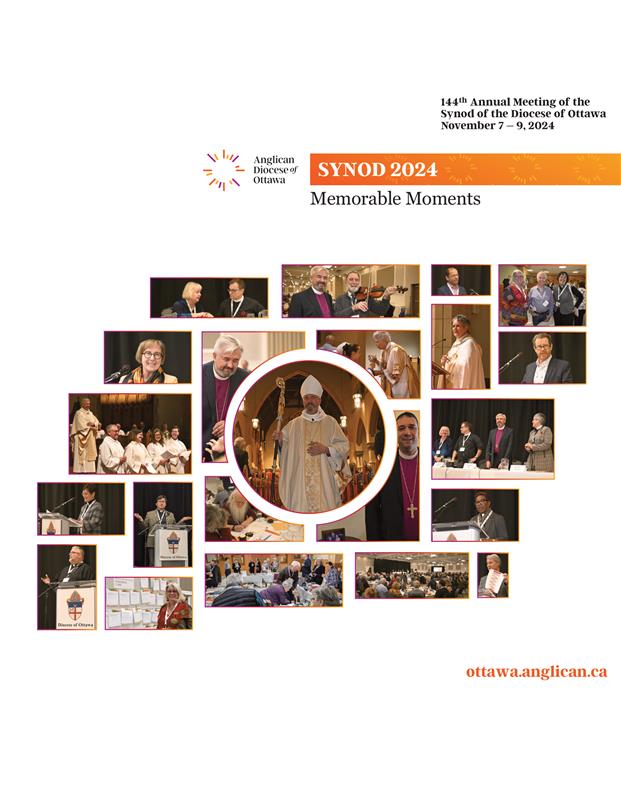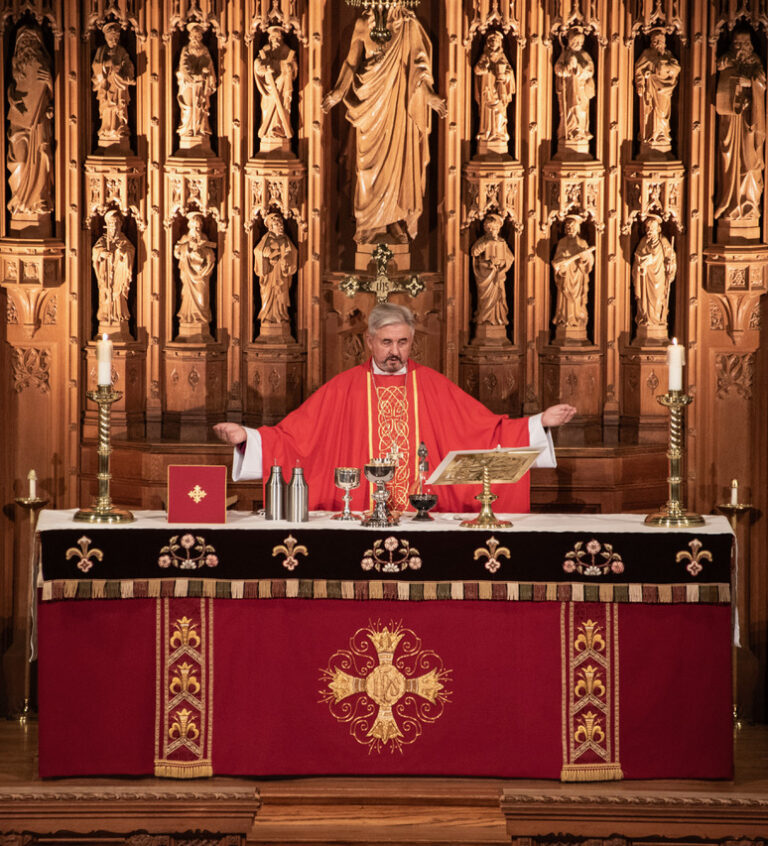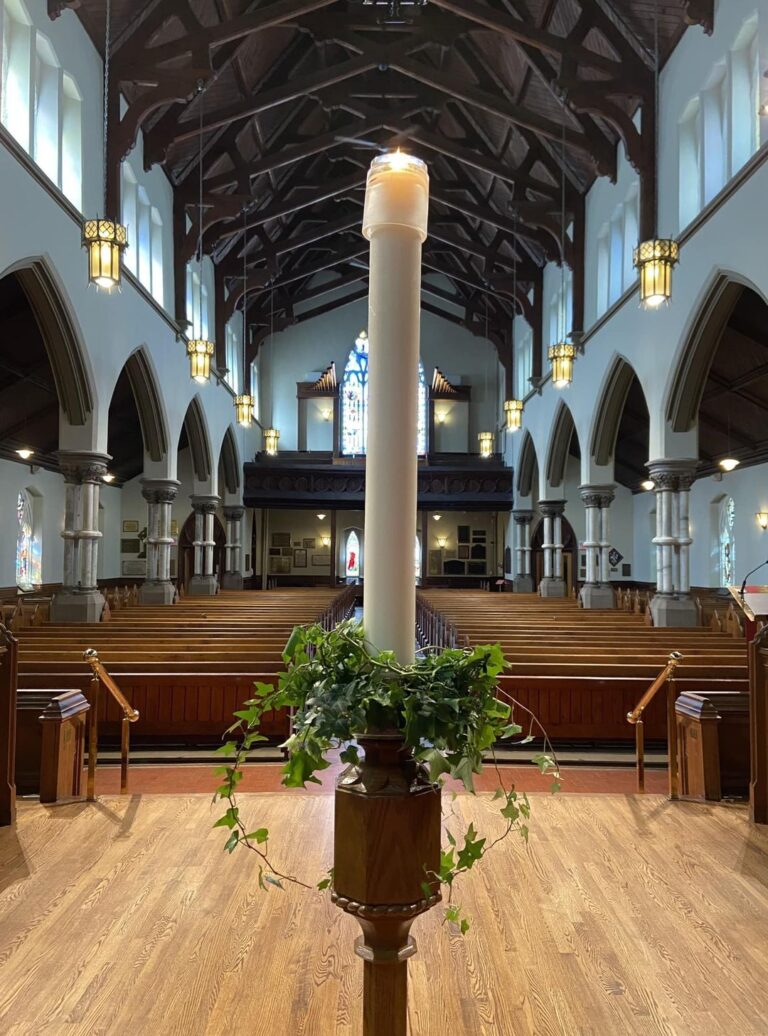144th Synod 2024 Highlights
Bishop’s Charge
In his charge, Bishop Shane Parker described the three-year journey the laity and clergy of our diocesan church have been on with him: “honestly assessing where we were at, and of carefully and collaboratively discerning what God was calling us to do.”
He outlined the 6 Results emerging from that discernment and the actions and budget affirmed last year:
Result 1: reducing reliance on parish revenues to fund our shared operations and staffing.
Result 2: providing increased assistance and support to parish leaders from Ascension House
Result 3: providing guidance to parishes facing major change and promoting collaboration and innovation across our diocese.
Results 4-6: addressing training needs through the new Learning Commons (managed by the Education Committee of Diocesan Council). In addition, Ascension House staff have worked with others to bring much greater clarity to canons and by-laws concerning the governance of parishes.
Bishop Shane concluded by saying that as our diocesan church moves through this triennium, “we will cherish the beauty of Christ that has been entrusted to our diocesan church, and we will seek to share that beauty, with humble confidence and expansive generosity, wherever God is calling us to be.”
Telling our Parish Ministry Story
Synod members were led in a collaborative exercise to help tell the stories of parish ministries across the diocese. Each parish was asked to consider five different aspects of their ministries and describe what their parish had done recently in each one—worship, building care, formation and learning, pastoral care, and engaging with the broader community. A sampling of these responses was shared with the synod following the exercise.
Triennium’s 6 priorities
Directors of Ascension House departments provided updates on the 6 priorities for the Triennium outlined at last year’s Synod and progress toward achieving the 6 results.
-
Financial Ministry (result 1 – reducing reliance on parish revenue)
- Parish Proportional Share (PPS) was reduced by $460,000 from the 2023 to 2024 diocesan budget, which translates to a 20.5% reduction in PPs.
- Dividends from central/diocesan trust funds were used to compensate for the reduction.
- Clergy Retirement Fund was discontinued at the end of 2023, which led to a savings in the ECOPS pool of 1% (amounting to approximately $50,000). These savings will be passed on to our parishes through the ECOPS billings process for 2025. (Note: The Clergy Retirement Fund was not related to clergy pension funds.)
- Our Diocese will try to minimize ECOPS inflationary increases by absorbing them internally to the best of our financial abilities for 2025 and onwards
-
Property and Asset Management (result 2 – increased assistance to parishes)
- The diocesan building survey was distributed to parishes. It provides an inventory of building and property assets that has helped Ascension House staff provide practical help, and has helped link parishes with similar assets. This has allowed parishes to discuss and lean on one another when similar issues arise.
- Parishes are being encouraged to do preventative maintenance rather than reactive work.
- We are working with the Bereavement Authority of Ontario to make the reporting requirements around cemeteries manageable and sensible.
- Slightly more than $5 million in excess properties were liquidated this year. Annual leases, whether that be parking or residential, have been worth $200,000.
- We continue working with colleagues and clergy on the 35-unit Hollyer House affordable housing project.
- Following the fire at St. Luke’s Anglican Church in 2022, St. Luke’s Table has been restored, but further renovation work is now a priority.
- We also facilitated a $108,000 grant from the Ontario Trillium Fund for Centre 105 in Cornwall, used to add accessible washrooms and a shower.
-
Communications, Development and Digital Solutions – (Result 2 – increased assistance to parishes)
Our Anglican Diocese of Ottawa website (with total visits of more than 75,000) serves as a vital connection point for our Anglican faith community and beyond. Every tool, resource and update support parish and community ministries:
- Social media: Reaching nearly 40,000 people on Facebook alone, we’re expanding engagement and creating spaces for meaningful interaction.
- Publications: More than 171 stories published in Crosstalk and Perspective.
- Communications: provides support with media inquiries, crisis communications, and consultations, ensuring parishes and ministries have the guidance that they need.
Development plays a vital role in supporting both parishes and community ministries by providing guidance, resources, and funding information. We offer guidance in several key ways:
- acting as the Ascension House liaison to the Episcopal Panel on parish stewardship;
- consulting with stewardship experts and developing practical training tools and resources;
- providing presentations and materials for congregations; and,
- assisting in applying for the parish stewardship resource hub.
Digital Solutions
This past year, our department led four key initiatives to make it easier for parishes and community ministries to connect, collaborate and securely access essential information:
- moved Ascension House to a new Microsoft SharePoint system, essentially cloud solutions, improving email, adding new tools and increasing security;
- expanded digital access to Crosstalk with Perspective, our new online edition;
- developed a parish-focused landing page on our ADO website to provide essential resources in one easy access location; and,
- work is underway to create a secure gated portal on our website, which will provide clergy and parish leaders private access to resources, including our upcoming resource hubs.
-
Human Resources (Result 2 – increased assistance to parishes)
In the last year:
- 72 new employees were hired across the diocese, both in the parish and community ministries.
- 59 employees left, resulting in an increase of about 6%.
- Ascension House now supports 247 employees across the diocese.
-
Guiding major change in parishes (Result 3 – Our Bishop will provide guidance to parishes facing major changes and will promote innovation and collaboration.)
- 15 years ago, the Anglican Diocese of Ottawa had 74 parishes, but 45% of them were in some way vulnerable.
- Today, the diocese has 49 parishes but only 6% of them might be considered vulnerable in some way.
- This reduction in vulnerability arose through active engagement by affected parishes, working in consultation with the bishop.
- Our diocese is committed to maintaining relationships with our people, even when this might involve changes to buildings or parish structures.
- An online guide for parishes considering major change is available on our diocesan website.
- The Bishop invites consultation as parishes talk about major change.
- A new Episcopal panel on hospital ministry and our new youth ministry, ADOy, have been established to guide collaboration and innovation.
-
Learning Commons: Parish Development (Results 4, 5 and 6)
- Almost 100 people attended a workshop for treasurers, church wardens, and clergy in April.
- A workshop on governance, employment issues, and safe church was attended by 97 people in May.
- Several anti-racism events have been held over the past year, each taking a creative, interactive approach to training.
- Two in-person cemetery workshops were held, one in Quebec and one in Ontario.
- The Learning Commons also includes resource hubs and knowledge networks, which aim to bring people together around topics of common interest and to share practical resources.
- Information about hubs and networks will soon be available on the website.
- The first resource hub will be about rural ministry and other hubs are being planned, including ones for parish stewardship and for children’s and family ministry.
Parish Development
Parish development is about creating healthy, hospitable parishes that are financially sustainable and are able to be thriving and vibrant communities within the community that surrounds them. Videos on parish development will soon be available on the ADO website. The first will be a general overview and then next is “going to be about developing a vision and setting priorities for your parish as you move forward.”
Contextual Mission
Some helpful resources have been included on our diocesan website
- A step-by-step guide for contextual mission (in the For Parishes section)
- Resources for the Time of Prayer initiative (in the Time of Prayer section)
ADO-y (Anglican Diocese of Ottawa Youth)
ADO-y is a new ministry that brings young people (ages 12 to 18) from across the diocese together on a seasonal basis. The ministry is rooted in parishes and involves events and activities focussed on experiential learning, leadership development and having fun. The first event of the year was a meet-and-greet at Christ Church Cathedral Ottawa.
Canons and Bylaws
Several motions to amend the Diocesan Canons and Bylaws were presented. These proposed:
- changes to parish governance;
- removal of references to residential schools;
- changes to terminology around financial matters, including removal of references to the clergy retirement fund;
- clarification of roles for Synod Officers and Executives of Synod;
- housekeeping amendments; and,
- clarification of diocesan indemnification authority.
The motions were all carried.
Anglican Community Ministries
Synod heard a presentation on our diocese’s community ministries: Belong Ottawa, Centre 105, Cornerstone Housing for Women, the Ottawa Pastoral Counselling Centre and the Refugee Ministry Office. These face ever-increasing challenges, but continue to serve our world in ways reflecting the goodness and generosity of our Creator.
Housing Justice
A new Bishop’s Panel on Housing Justice has been created. The panel will:
- encourage every parish to be engaged in housing justice in some way, using the four pillars of prayer, learning, advocacy, and action as educators;
- regularly respond to opportunities to speak with local officials;
- provide written submissions to the government regarding housing policies;
- participate in conversations with our diocese about the use of surplus property and potential for affordable housing in conjunction or partnership with government and community partners;
- continue to provide monthly articles in Crosstalk and Perspective on housing justice;
- keep looking for opportunities to bring the voice of the Diocese to government policy;
- provide resources for parishes looking to assess their readiness to engage in housing initiatives.
Synod Reflector
The Rev. Dr. Dawn Davis, assistant professor of Contextual Learning at Huron University in London, Ontario, was the guest reflector for Synod.
Rev. Dr. Davis praised the process and work the diocese has been doing for the past few years to create a well-ordered and resourced diocesan church with healthy parishes equipped to serve. Her aim in her talks was to help Synod members look to the horizon to see what might be coming next. Davis encouraged listeners to remember to ask themselves why they are doing what they do. She also encouraged us to consider ways to articulate how faith in the Divine has given us a new beginning: what is it like to experience forgiveness and healing through trust in God?
Greetings from Jerusalem
Archbishop Hosam Naoum of the Episcopal Diocese of Jerusalem sent a greeting to Synod in a recorded video message. Bishop Shane asked us to pray, donate and reach out to individuals and agencies who are either struggling or serving to alleviate the effects of obscene violence in the land of the Holy One. He mentioned PWRDF, UNICEF, Canadian Red Cross as agencies that are seeking to bring relief to those who are suffering. He conveyed Archbishop Hosam’s request to pray fervently for peace, justice, and reconciliation for all Jews, Muslims, and Christians in the land where Jesus walked.
Elections
The following were elected to Diocesan Council for a three-year term:
- The Rev. Adam Brown
- The Rev. Dr. Mary-Catherine Garden
- Kate Jordan
- Lyoness Woodstock
The following were elected as members of General Synod:
- The Rev. Matthew Brown
- The Rev. Dr. Jon Martin
- The Ven. Kathryn Otley
- Caroll Carkner
- Kate Jordan
- Katherine Spencer-Ross
The following were elected to sit for a one-year term on the Advisory Panel on Termination of Clerical Appointments:
- Marie Cheesman
- The Rev. Gillian Hoyer
- The Rev. Canon Douglas Richards

A Vogue photo cover box happened to be at the St. Elias Centre from a previous event during Synod. Some of those attending got into the spirit and had some fun.
Related Articles
October 19, 2023
The Bishop's Charge to Synod 2023
October 21, 2023




